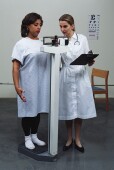
FRIDAY, Nov. 9 (HealthDay News) — U.S. medical schools do a poor job of teaching students how to deal with weight issues in obese patients, according to a new study.
Researchers analyzed more than 200 articles about obesity-related medical-school training that were published between 1966 and 2010. Only five of the articles dealt with ways to increase medical student’s knowledge, attitudes and skills regarding treatment of overweight and obese patients.
Only two of the five articles dealt with medical student bias toward obese patients, and just one addressed how to change this bias, according to the Wake Forest Baptist Medical Center researchers.
They said their findings are consistent with doctors’ reports of inadequate training in helping patients manage their weight.
The study was published in a recent issue of the journal Teaching and Learning in Medicine.
“Our study shows clear gaps in medical education regarding obesity,” lead author Mara Vitolins, professor of public health sciences, said in a Wake Forest news release.
She said medical students need to be provided with the skills to address overweight and obesity in patients in order to help reduce the national obesity epidemic and to reduce the number of deaths and chronic diseases associated with excess weight. It’s also vital for medical schools to reduce students’ negative attitudes toward overweight and obese patients, because such attitudes could affect patient care.
“Medical students are surrounded by the same environment that everyone is in this country — a culture of idealized images of physical attractiveness in which thin is good and fat is bad,” Vitolins said. “We just aren’t doing a good enough job of teaching our students evidence-based methods of intervention and care for our obese patients.”
More information
The U.S. National Heart, Lung, and Blood Institute explains how overweight and obesity are treated.

